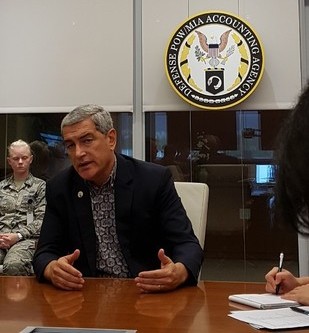 |
|
Kelly McKeague, director of the US Defense POW/MIA Accounting Agency (DPAA) explains the details and complication of recovering the remains of US soldiers who perished during the Korean War on North Korean territory. (by Lee Je-hun)
|
Kelly McKeague and An Ik-san discuss timeframe, method and conditions for exhumation
Kelly McKeague, director of the US Defense POW/MIA Accounting Agency (DPAA), has been directly corresponding with North Korean Lieutenant General An Ik-san to discuss the recovery of the remains of US soldiers killed in North Korean territory during the Korean War. This discussion includes details such as the timeframe, method and conditions for the exhumation efforts, which were agreed to in the joint statement signed by North Korean leader Kim Jong-un and US President Donald Trump on June 12. “During the letters I’ve exchanged with North Korean Lieutenant General An Ik-san, we’ve discussed concrete details such as the timeframe of the recovery. I sent my most recent letter to An three weeks ago,” McKeague said. He made these remarks during an interview that took place when a South Korean delegation from the South Korea-US Security Forum visited DPAA, which is located at the US Indo-Pacific Command in Hawaii, on Oct. 23. “My most recent letter deals with related areas of progress, including the fact that the proposal we’re going to give North Korea hasn’t been finalized but probably will be within two weeks,” McKeague said, without getting into the details of the proposal that the US government is working on. “DPAA is directly responsible for the recovery of remains,” McKeague said, adding that he’d “received permission from Secretary of State Mike Pompeo to directly contact An Ik-san for deliberations” without specifying the timing. McKeague emphasized that DPAA has been authorized by Pompeo to “contact and deliberate with the North Koreans regardless of whether there is progress toward denuclearization.” “Lieutenant General An and I have been exchanging letters by way of the North Korean [and American] delegations to the UN in New York,” McKeague added. In a statement released on July 15, Pompeo said that North Korea and the US “agreed to re-commence field operations in the DPRK to search for the estimated 5,300 Americans who never returned home” during general-level military talks that were held between the UN Command and the North Korean military at Panmunjom on the same day. At the time, Pompeo did not mention any of the details of the recovery operations, such as timeframe or method, but the correspondence with An Ik-san mentioned by McKeague appears to serve as the follow-up deliberations to those general-level talks. “Next year, we’re planning to work on recovering the remains of American soldiers in 47 countries around the world, and North Korea is obviously one of those. But the final decision hasn’t been made on the question of recovering remains in the North Korean region,” McKeague said. “I hope our deliberations with North Korea will go well so that we can resume the recovery efforts with the North Koreans at Jangjin Lake and Unsan County in March of next year,” McKeague said, adding that “By our calculations, over a thousand American soldiers were lost around Jangjin Lake and over a thousand were lost around Unsan County during the Korean War.” An Ik-san, whom McKeague has identified as his counterpart in the negotiations, is one of the top negotiators in the North Korean military, and he’s in charge of the North Korean People’s Army’s delegations to general-level military talks with the UN Command and with South Korea. McKeague said that An also attended the repatriation ceremony of the remains of American soldiers that took place at Wonsan’s Kalma Airport on July 27. Recovery operation expected to be resumed next March Jennie Jin (Korean name Jin Ju-hyeon), an anthropologist who works at DPAA’s Central Identification Laboratory, was at Wonsan when the remains were repatriated. “When we arrived at Wonsan, the North Koreans were well-prepared; for each of the 55 boxes [containing the remains of American soldiers], they’d brought personal effects and detailed records of their recovery. Thanks to that, the work proceeded in a very amicable atmosphere,” Jin said. “Because so much time has passed, none of the 55 boxes sent by the North Koreans contain the complete remains. But in September, we managed to identity two American soldiers. With one of two identified soldiers, the North Korean officials’ hints were a big help because they gave us a set of dog tags and said the owner of the tags was definitely in a certain box or one of the boxes around it,” Jin said. “Some people say that some of the remains of American soldiers that North Korea has sent are actually animal bones, but that’s not true. So far, the North Koreans have never sent the US animal bones.” By Lee Je-hun, senior staff writer Please direct comments or questions to [english@hani.co.kr]





